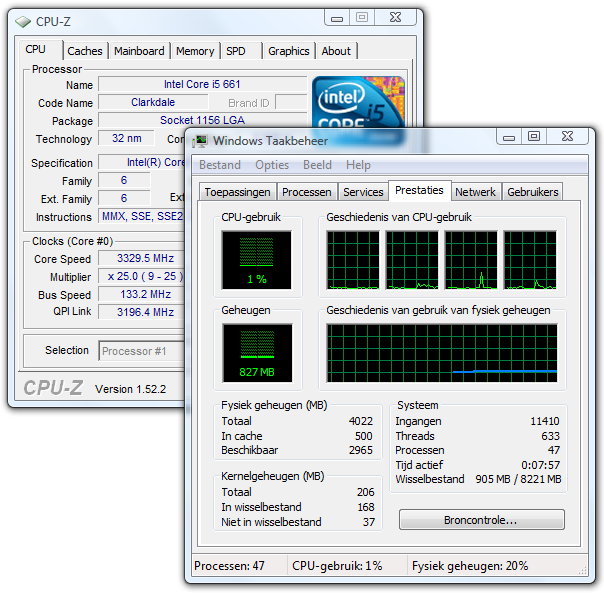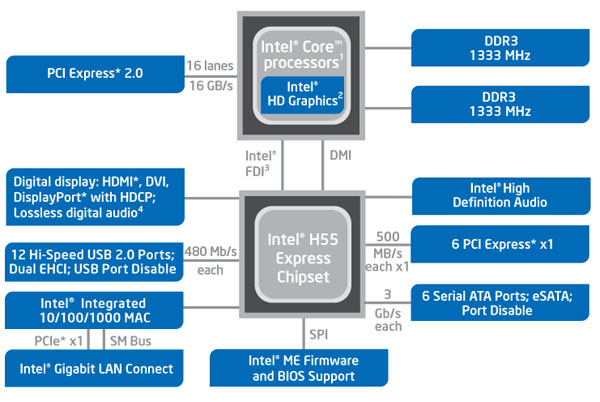Hyper Threading | H55 PCH | Nehalem overview
Hyper Threading
Inevitably, all chips based on the Nehalem family will have between two and eight cores, and will be capable of handling two independent software threads per core. This is called Hyper-Threading, Intel's name for the concept. It allows a processor to execute two different code streams at pretty much the same time.
This was a feature found in Intel's single-core Pentium 4 processors but largely discontinued with the advent of multi-core chips, but it's essentially the same technology as before. With two threads per core, Core i3, i5 and i7 chips will pack no less than four or eight logical cores depending on the model.
If you look at the screenshot below you can see that happening. Mind you that the Core i3 540, 530 and then Core i5 650, 660 and 661 have Hyper-Threading, the Core i5 750 processor weirdly enough does not (unfortunately) have Hyper-Threading. All other Core i7 processors are hyper-threaded as well.
 Example of a Core i5 661 - It has two physical cores, but hyper-threaded we gain two 'virtual' logical cores.
Example of a Core i5 661 - It has two physical cores, but hyper-threaded we gain two 'virtual' logical cores.
Placing the Nehalem processor family in perspective
Intel has got a lot in store with the Nehalem family processors right now. We placed all data that we know of into a chart, also this is a handy chart to see which processor has which socket/package and what more you can expect anno Q1 2010 desktop processor wise (we left out the mobile parts).
| Model | LGA socket | Core/Thread | Clock | Turbo boost | L3 cache | TDP | Price | |
| 45nm Bloomfield |
Core i7 975 | 1366 | 4/8 | 3.33 | 3.60 | 8 | 130 | 999 |
| Core i7 950 | 1366 | 4/8 | 3.06 | 3.46 | 8 | 130 | 562 | |
| Core i7 920 | 1366 | 4/8 | 2.66 | 2.93 | 8 | 130 | 284 | |
| 45nm Lynnfield |
Core i7 870 | 1156 | 4/8 | 2.93 | 3.60 | 8 | 95 | 562 |
| Core i7 860 | 1156 | 4/8 | 2.80 | 3.46 | 8 | 95 | 284 | |
| Core i7 870s | 1156 | 4/8 | 2.80 | 3.46 | 8 | 82 | 337 | |
| Core i5 750 | 1156 | 4/4 | 2.66 | 3.20 | 8 | 95 | 196 | |
| Core i5 750s | 1156 | 4/4 | 2.66 | 3.20 | 8 | 82 | 259 | |
| 32nm Clarkdale |
Core i5 670 | 1156 | 2/4 | 3.46 | 3.73 | 4 | 73 | 284 |
| Core i5 661 | 1156 | 2/4 | 3.33 | 3.60 | 4 | 87 | 196 | |
| Core i5 660 | 1156 | 2/4 | 3.33 | 3.60 | 4 | 73 | 196 | |
| Core i5 650 | 1156 | 2/4 | 3.20 | 3.40 | 4 | 73 | 176 | |
| Core i5 540 | 1156 | 2/4 | 3.06 | none | 4 | 73 | 143 | |
| Core i5 530 | 1156 | 2/4 | 2.93 | none | 4 | 73 | 123 | |
| Pentium G9650 | 1156 | 2/2 | 2.80 | none | 4 | 73 | 87 |
PCH - The Platform Controller Hub H55 chipset
To facilitate the Clarkdale processors, Intel needed to come out with a new chipset, in fact they'll be released two of them each with their own derivative sidekicks. This is needed to run the integrated graphics via what's labeled as the Flexible Display Interface (FDI). Intel is offering two new chipsets to the market, H55 and H57/Q57. P55 actually should also work fine, yet obviously not with the embedded IGP.
Now you might think the platform will be cheap and well, it's average at best. Intel will charge its partners 40 to 44 USD per chip per 1K units. In pale comparison, Intel charges 40 USD for a P55 chip to the motherboard manufacturers.
So enough tech chatter, let's put the gear to the test. We received an H55 motherboard and Core i3 530 dual core processor for a test run. Let's check out what this 99 USD processor will bring to the table. But first, let's have a look a some photos of the processor.

